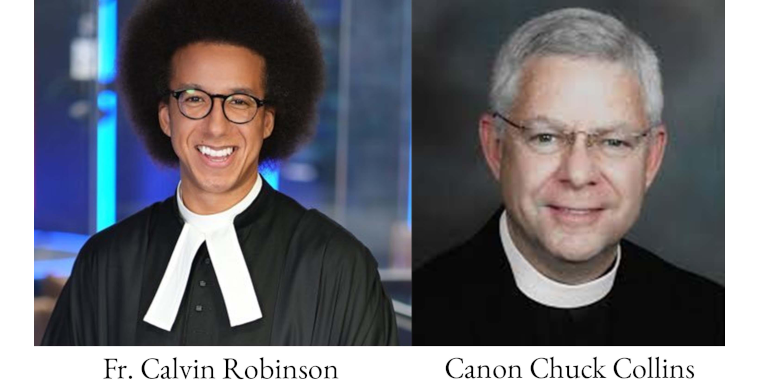Two Anglican Leaders Duke it Out Over What It Means to be Anglican
By David W. Virtue, DD
www.virtueonline.org
May 12, 2023
Fr. Calvin Robinson is an up-and-coming conservative British commentator, writer, and broadcaster on political and Anglican issues. He is a deacon in the Free Church of England. Calvin describes himself as an Anglican in the Anglo-Catholic tradition.
Canon Chuck Collins is the Director for the Center for Reformation Anglicanism. He has served as rector of Episcopal and Anglican churches in Texas and Florida. He is a notable clergyman who has argued against the conciliar nature of the ACNA in favor of a confessional, Reformation Church. He has written extensively for Christian journals and magazines and has been a canon theologian and retreat and conference speaker.
Recently Fr. Robinson wrote an article titled Catholics vs Protestants: The necessity for Church unity. He writes: "We may not all be in Communion with each other. But we are all in Communion with Christ. That should be a good starting point. Whilst we remain divided amongst ourselves, the enemy grows stronger and more targeted. We are doing the enemy's job for them."
Robinson argues that the bigger issue is the divide between orthodoxy and heterodoxy. "As Christianity declines in the West, the battle is no longer between Roman Catholic and Protestant denominations, or even amongst us Anglicans, between Anglo-Catholics and Evangelicals. The battle now is increasingly between orthodox and heterodox, between conservatives and liberals. We must band together, Catholics, Anglicans, Orthodox, Evangelical, Baptist, Methodist, and Pentecostal, to protect the faith against liberal-progressive secularization. To do that, we must live out our faiths fully."
Noble words indeed.
Robinson goes on to say that some people are stuck in the Reformation in much the same way that many a Remainer is immovable from the Brexit referendum, and in the same way some Americans could not get past the election results of either 2016 or 2020, #notmypresident.
"As an Anglican, and an Anglo-Catholic at that, I don't easily fit into any of the usual boxes, and that can be difficult for some people. I don't subscribe to papal infallibility, but I do pray the rosary daily; I love the Book of Common Prayer, but I go to Mass regularly. I am not confused, my theology has been perfectly articulated by many scholars before me, from William Laud to Edward Pusey, King Charles I to Vernon Staley.
"I see the Anglican Church as the English expression of the Catholic faith and the Reformation as an unfortunate necessity - recovering the Gospel, returning to the Church Fathers, restoring the faith and ridding the Church of corruption and superstition."
He further argues that, "schism is not good, separation is not to be desired, and we should pray and work toward a united Church. The Council of Vatican II reported that Catholics today should not hold Protestants of today to blame for the sin involved in the separation, and I think that works both ways. We should focus on the things that unite us, such as our faith in Christ, over the things that divide us, such as our worship styles."
RESPONDING to Fr. Robinson's take, Canon Chuck Collins offered up this:
"Calvin, I don't recognize Anglicanism as you describe it, in your words: a "19th century innovation." I hear you call for unity of mission and evangelism, but the only unifying point you identify is our common abhorrence of same-sex blessings and a vague reference to Prayer Book worship.
"My brother, to what is your theology and practice tied beyond the 19th century tractarian innovations? A cursory understanding of our history shows, as Peter Nockles writes, that the Oxford Movement and the succeeding ritualist movements that you speak so fondly of, constitutes a radical departure from everything before, including the church fathers and Anglican high churchmanship.
"You are tied to Anglo-Catholic ideals and practices, but to what are these tied beyond your personal aesthetic preferences?
"In your apology for praying the rosary, the veneration of saints and the Virgin Mary, and your comments about the vacuous nature of the puritans and the "unfortunate necessity" of the English Reformation, I kept wondering how this is any different from other innovations on the buffet table of Anglican aberrations to choose from.
"If we are not tied to the Thirty-nine Articles, the two books of Homilies, and the 1662 Book of Common Prayer, as we have affirmed consistently and historically, and subscribed to before the 1830's, we are tethered to nothing. If the Formularies, as fragile as they are, will not hold us, Anglicanism has no distinctives.
"We have nothing to offer the world dying to hear about God's saving grace in Christ. The church that stands for nothing will fall for anything as we see in modern-day Anglicanism. We cannot rally around our common hatred of gay marriage, or even a missionary impulse to plant more churches. Mission comes from theology, and theological problems can only be solved theologically. "
Canon Collins concluded his remarks by saying this:
"Calvin, I know you intended your comments to be helpful, but I find them to be dangerous and hurtful. They are disconnected from the landscape of our history. There must be generosity and freedom in our styles of worship and even in areas of belief where there is not biblical agreement, but the Anglicanism you describe is nothing like the Anglican heritage that I hold to and which gives me hope for our future.
"[My hope] is that the platform God has graciously given you will be used for sake of the gospel of God's grace and gratitude that is enshrined in our historic formularies."
END














